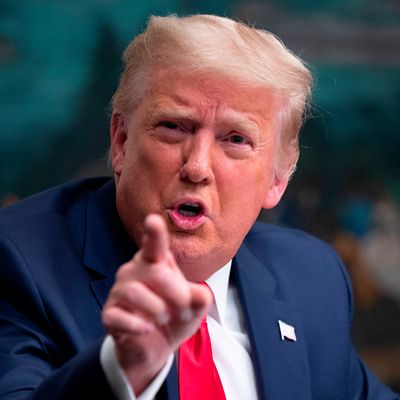
President Trump’s efforts to remain in office by negating the 2020 election have consisted of public and private lobbying of Republican officials. An extraordinary example of the latter is a recorded conversation of the president pressuring Georgia secretary of State Brad Raffensperger to manufacture “evidence” of fraud that would hand the state’s electoral votes to him.
The Washington Post obtained a recording of Trump floating a series of baseless claims of fraud as a pretext to have himself declared the winner. “So look,” he asserts at one point, “All I want to do is this. I just want to find 11,780 votes, which is one more than we have. Because we won the state.”
Trump advertised his call with Raffensperger on Twitter, claiming the Georgia secretary of State was unable to answer the various charges of fraud that he floated:
The tape shows that, in fact, Raffensperger repeatedly told Trump his various conspiracy theories were all false. Indeed, Georgia’s voting machines create paper records that make the kind of electronic fraud Trump alleges impossible. An audit of the results in Georgia disproved the charges Trump and his allies have been circulating.
In several key respects, Trump’s call with Raffensperger echoes the famous call he held with Ukrainian president Volodymyr Zelensky. In both calls, Trump is propagating conspiracy theories as a kind of cover to get a result that would help him win. In Ukraine, his conspiracy theory was that Joe Biden demanded the firing of a prosecutor in order to protect his son’s business dealings, and his ask was the announcement of an investigation that he could use to depict Biden as corrupt. Both calls had Trump somewhat subtly threatening adverse consequences if his counterpart failed to submit. (Trump dangled a face-to-face meeting with Zelensky; with Raffensperger, he warned that the Georgian was taking “a big risk,” and that Republicans might not turn out for the Senate special election if he did not appease Trump.)
Both calls, too, reveal Trump to be just as rambling and incoherent on the phone as he sounds in his press appearances and manic tweets. The president floats a series of wild claims of wrongdoing in Georgia, including a bizarre story that Dominion Voting Systems secretly removed parts of its voting machines. In his call with Raffensperger, Trump cites “rumors” of vote fraud, which is not exactly a solid basis for overturning the result of an election.
What comes through in both calls is that Trump has very little interest in the specificities. The audio of his call with Raffensperger is worth listening to. Trump does not sound like a man who believes he has uncovered a serious crime. He sounds, instead, like a man who is engaged in a negotiation, offering his counterpart a cover story he can use to deliver the goods.
And Trump’s demand in this negotiation is very simple: 11,780 votes, enough to flip the state. He doesn’t care what process or rationale Raffensperger employs to arrive at that bottom line, any more than he cared what section of the Ukrainian criminal code Zelensky would charge Biden with supposedly violating.
But Trump’s desire to compel Raffensperger’s cooperation is very real. Many clever minds have insisted that Trump does not really pose a threat to the republic because he does not really want power. He wants attention, or perhaps he wants to monetize his hold over the Republican base, and is merely pretending to be engaged in an autogolpe. And while it is true that Trump lacks the capacity, at the moment, to fulfill his desires, his intentions are indeed deadly serious.






























